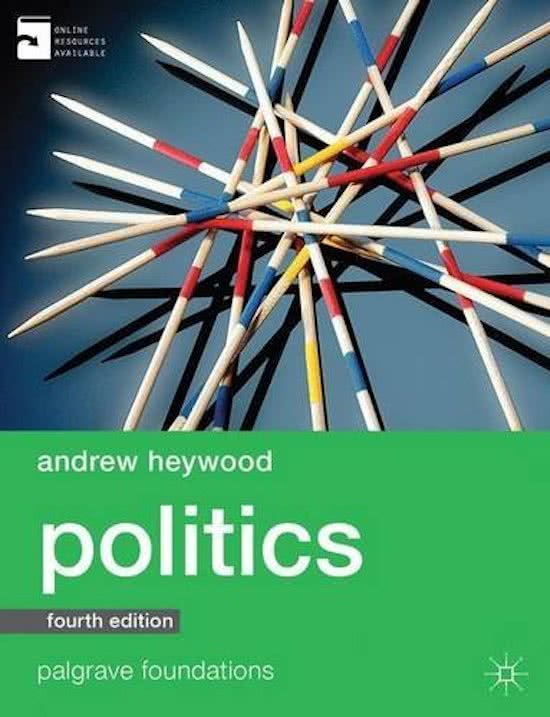INTRODUCTION TO
POLITICAL SCIENCE
Social Sciences @ VUB
Jolien Haelterman
,Lesson 1 : What is politics?
Defining Politics
Politics
= The activity through which people make, preserve and amend the general
rules under which they live?
= Social activity ( it needs a society to develop)
= Linked to conflict and cooperation. Development of rules is necessary to
resolve conflicts and foster cooperation in society.
= essentially contested concept
There are 4 different views on politics:
1) View 1 : The art of government
Politics is what concerns the state/government, it’s about running a
country.
= traditional view, but restricted sine there are many actors, institutions
and processes outside politics. Ex. NGO’s; Greenpeace, …
2) View 2 : Politics as public affairs
Politics is what concerns public life and public sphere. Therefore, private
life is non-political.
Public sphere = institutions and organizations that are open, operating in
public and to which the public has access.
= broader view of ‘the political’. Politics is the state, NGO’s, trade unions,
… while private is personal, family, domestic life, …
The political/personal divides subjects to:
Historical evolution
Cultural variation
Constant reinterpretation
3) View 3 : Politics as compromise and consensus
Politics is a way of resolving conflict by compromise and negotiation.
Politics relates to how decisions are made.
It is a political solution to a conflict (= military solution)
= Positive connotation since politics is seen as civilized and a civilizing
force.
4) View 4 : Politics as power
Politics is present in all social activities and in every social interaction.
Politics is the exercise of power by one person and the entity over
another. There can be use of force, manipulation, intimidation, promise of
reward, …
There are 3 faces of power (Lukes)
Power as decision-making
Power as agenda setting
Power as thought control
= very broad definition, since politics takes place in the public and private
sphere. ‘The personal is political’.
This has a negative connotation because politics is all about oppression
and subjugation.
,Studying politics
The origins of political science
- It’s an old field of study (Ancient Greece)
- Originally seen as a part of philosophy, history and law
- Throughout the 20th century, political science became a scientific
discipline on its own.
A scientific discipline
- It’s more than just talking about politics
- It is based on 4 orientations:
o Intellectual distance objective and politically neutral (which is
difficult)
o Guided by scientific principles, methods and tools
o In search of regularities systematic inquiry
o Scientific language
Approaches
Philosophical tradition
Empirical tradition
o Behaviourism = Studying politics by analysing
the opinions, attitudes, values and orientations
of people. It focuses on objective and
quantifiable data, achieved by large surveys.
o Rational choice = Studying politics by analysing
the rationally self-interested intentions of
political actors.
o New institutionalism = Studying politics by
analysing political institutions (= set rules,
procedures, norms, practices, …). It focuses on
how institutions guide and constrain behaviour
of individuals and organizations.
o Critical approaches = Studying politics by
looking at how power relations shape reality. It
focuses on analysing discourse and language.
Concepts
Tools with which we think, criticize, argue, explain and
analyse
Often single word or short phrase, referring to a
general idea about something
Ex. ‘democracy’, ‘equality’, ‘socialism’, ‘the state’,
‘political participation’, …
The meaning of the concept needs to be expressed in a
definition.
Some concepts are ‘ideal types’ (Max Weber)
o Focus on certain basic or central features of a
phenomenon
Essentially contested concepts:
o Large controversy about meaning of concepts,
so that no ‘true’ meaning can be used
o Multiple acceptable and legitimate meanings
exist for one concept
Ex. Democracy, justice, freedom, …
, Polyarchy (Dahl 1971)
o Elected officials control government and policy
o Elections are free and fair
o Inclusive voting rights
o Freedom of speech
o Citizens have access to alternative sources of
information
o Freedom of association
Models
Models offer a representation of reality
Models indicate links and ties between different
elements reduced complexity
Ex. David Easton’s model of the ‘political system’
(1965)
Input Demands/support Political system decisions
output
From decisions, feedback goes back to demands and
supports.
Theories
= systematic explanation of empirical data
Theories are used to describe and explain political
phenomena
Theories result from past research and direct future
research
Conclusion
Politics = social activity through which people make, preserve and amend the
general rules under which they live.
Variety of views on ‘the political’, ranging from narrow to broad views.
Politics is an essentially contested concept.
Political science = scientific study of politics
Political scientists use many different approaches in their studies of the political.
A variety of devices exist to help political scientists make sense of their
empirical data = concepts, models and theories.





